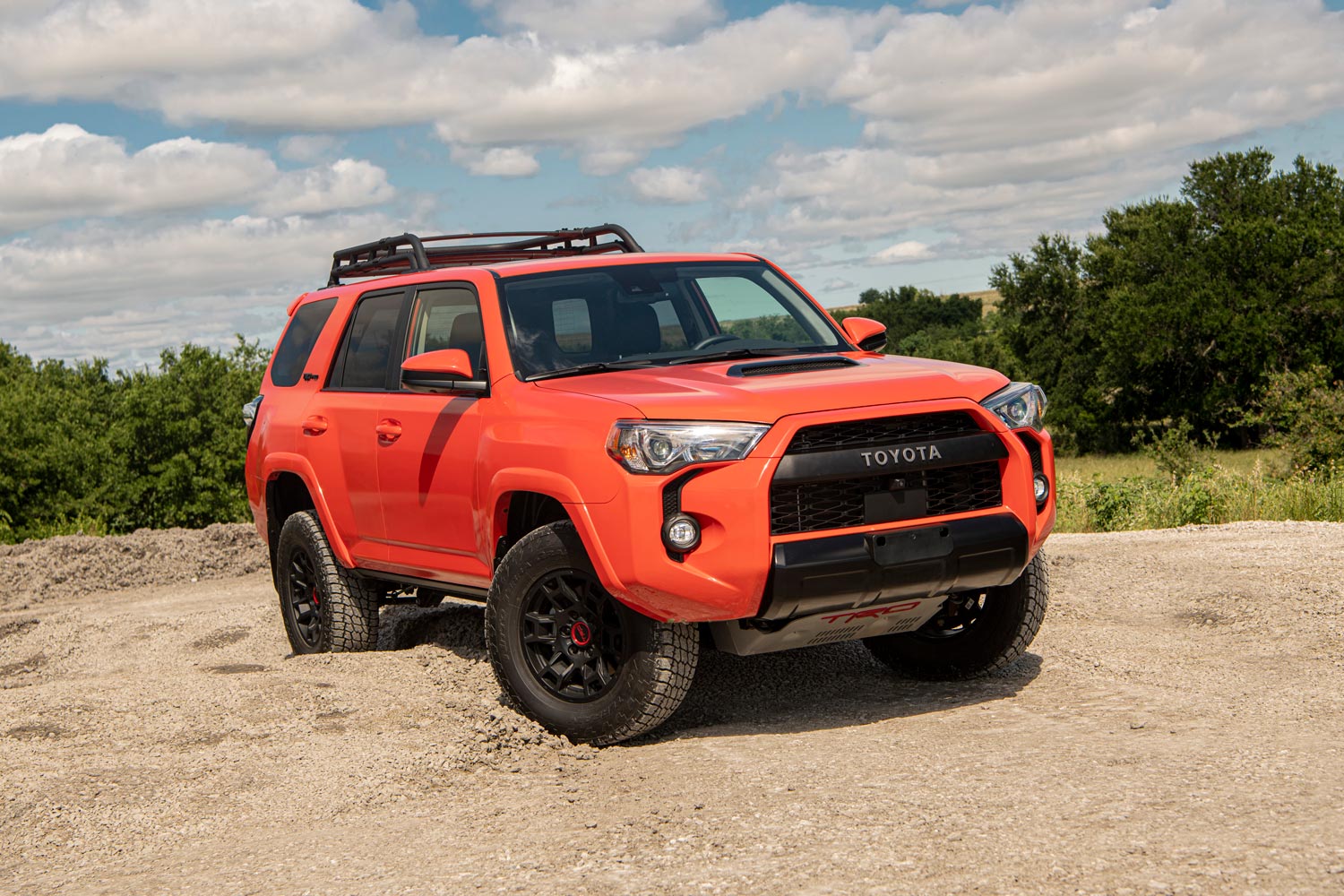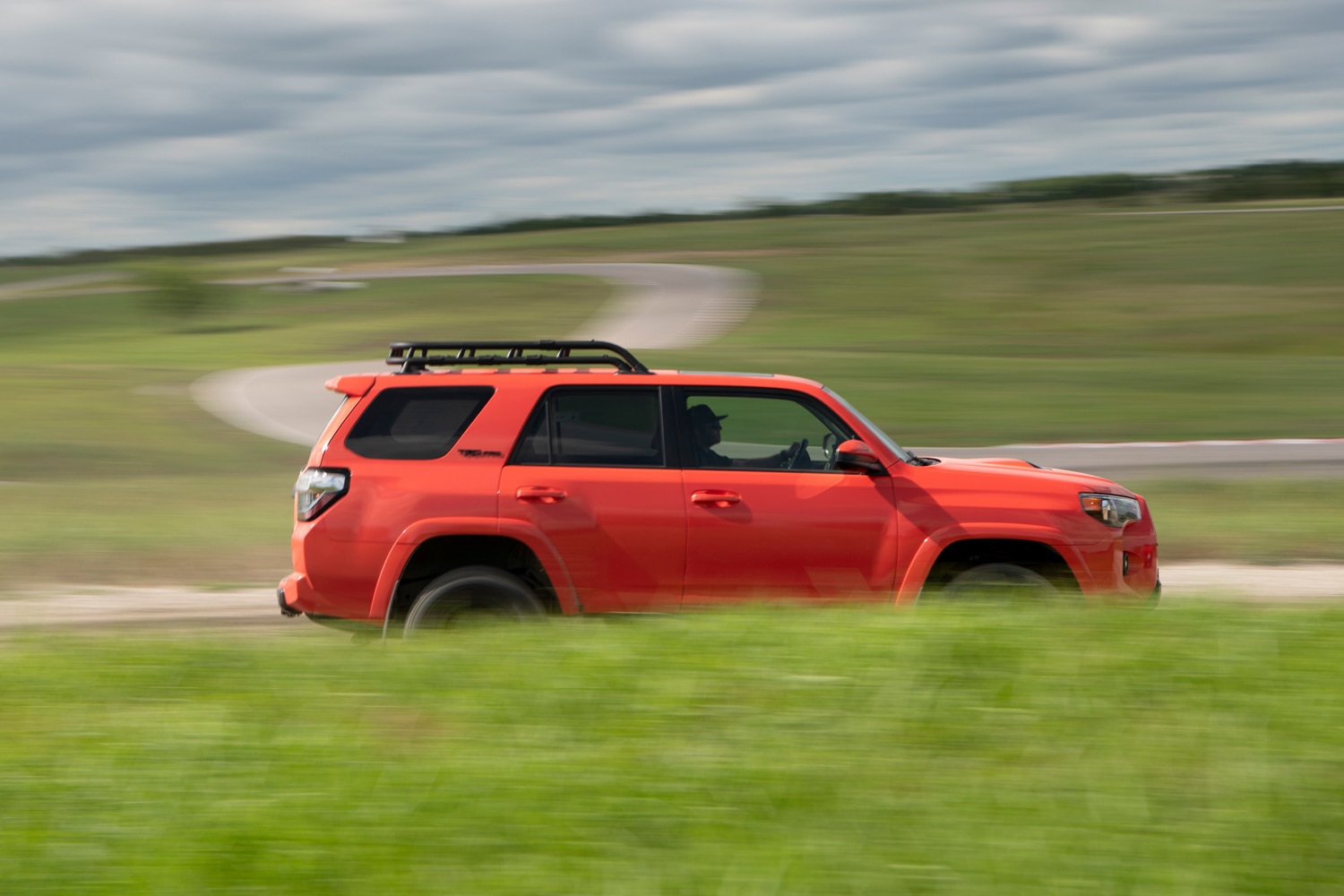Lifting a Toyota 4Runner: What You Need to Know
Here is how you can raise Toyota's rugged, mid-size SUV.
 Toyota
Toyota
The current generation Toyota 4Runner has been in production without huge changes since the 2010 model year, an eternity in car years. However, the midsize SUV has retained its appeal with decent off-road chops. The 4Runner's stock ground clearance is competitive at nine inches for two-wheel-drive models and 9.6 inches for four-wheel-drive versions. But if you plan to adventure further off the beaten path, you'll want a lift kit.
The best lift for your Toyota 4Runner
If you only care about looks and want to add a slightly larger tire, you can purchase an inexpensive aftermarket body lift for your 4Runner. 4Wheel Parts offers body lifts from two to three inches, priced from $130 to $400.
However, if you want more ground clearance than what comes from the factory, a suspension lift is recommended. This will raise both the frame and the body from the axle, leaving more room for larger tires and clearing off-road obstacles and terrain. Pricing for suspension lift kits starts about where body lifts leave off and go up from there. How much you spend will be directly related to what you intend to do with your 4Runner and how many components you upgrade.
 Toyota
Toyota
Lifting Your Toyota SUV May Void Part of Its Warranty
Toyota does not offer an optional body or suspension lift kit for the midsize Toyota SUV, so you'll have to turn to the aftermarket to raise your 4Runner.
Total Chaos Fabrication offers many suspension lift kits for 4Runners, old and new. Their lift kits for the current generation 4Runner feature upper control arms to maintain factory alignment specs and adjustable King 2.5-inch diameter coilover shocks. Depending on how you adjust the springs, you can get two to three inches of lift from this kit. You'll pay around $3,100 for a kit with front shocks only or $4,600 with rear shocks included.
Need more height? Check out the 6-inch suspension lift kits from Fabtech Motorsports. The $3,400 Basic package includes spring spacers, rear performance shocks (but retains the stock front shocks), differential mounts, and brake-line brackets. The $6,000 Performance kit adds upgraded shocks, with or without remote reservoirs.
If you want to go fast off-road, Total Chaos Fabrication has long travel kits with longer upper and lower control arms for maximum wheel travel as well as race-specific lighter-weight long-travel kits.
Remember that any aftermarket lift kit you put on your 4Runner may void part of the factory warranty on related components, in line with the Magnuson-Moss Warranty Act.
Other Things to Consider Before Lifting Your 4Runner
When buying a suspension lift kit for your 4Runner, it's important to find out if it is compatible with Toyota's Kinetic Dynamic Suspension System, or KDSS. The system consists of hydraulically actuated stabilizer bars that adjust depending on the terrain. Currently, KDSS is available on the 4Runner's TRD Off-Road and TRD Off-Road Premium trims. Some advise against lifting a KDSS-equipped 4Runner more than about two inches. If you want to have a high-riding 4Runner, you might want to avoid vehicles with KDSS.
However, if you raise a non-KDSS 4Runner higher than two inches, you'll likely need new wheels with a specific backspace and width. You might also need to modify your exhaust or add longer steel brake lines. If you add larger tires, re-gearing and a speedometer recalibration might also be necessary.
Lifting your Toyota 4Runner can give you more off-road capability, but it won't behave the same on paved roads. You'll also find its higher center of gravity may make it feel unstable. Your fuel economy will suffer as well. However, the off-road performance gains might make the time, money, and effort worthwhile.
Written by humans.
Edited by humans.
 Emme Hall
Emme HallEmme Hall loves small convertibles and gets out to the canyons in her 2004 Mazdaspeed Miata whenever she can. You can also find her in the dirt in her lifted (yes, that's right) 2001 Mazda Miata, or racing air-cooled Volkswagens in races like the Baja 1000. She's taken first place twice in the Rebelle Rally — once driving a Jeep Wrangler and then a Rolls-Royce Cullinan the second time. She was also the first driver to take an electric vehicle to the Rebelle Rally when campaigning the Rivian R1T to a top-five finish.
Related articles
View more related articles